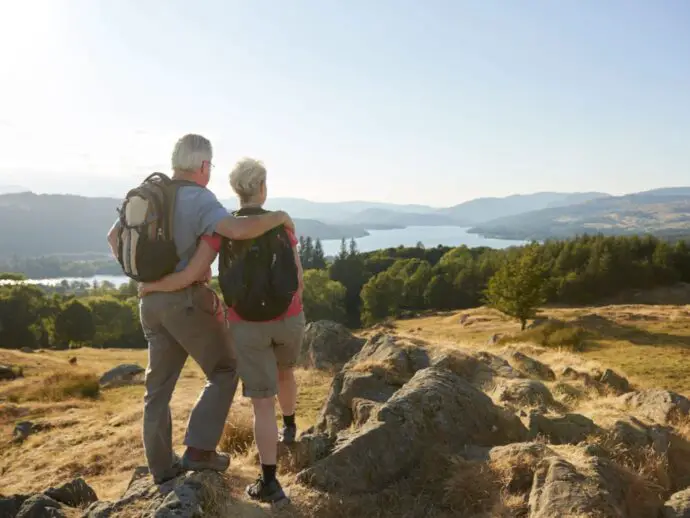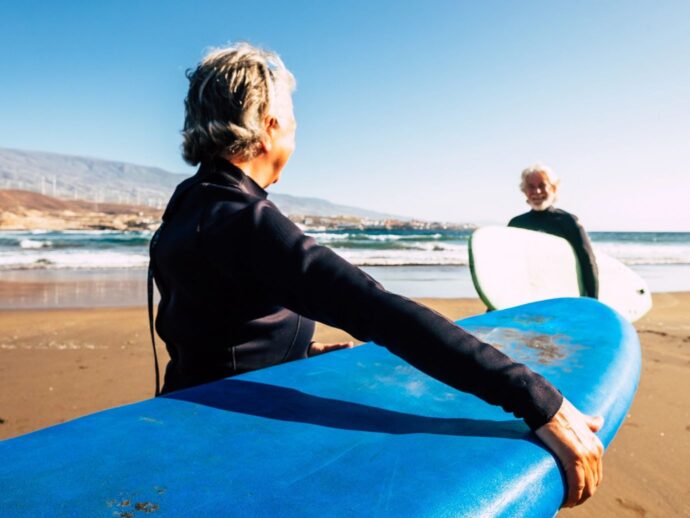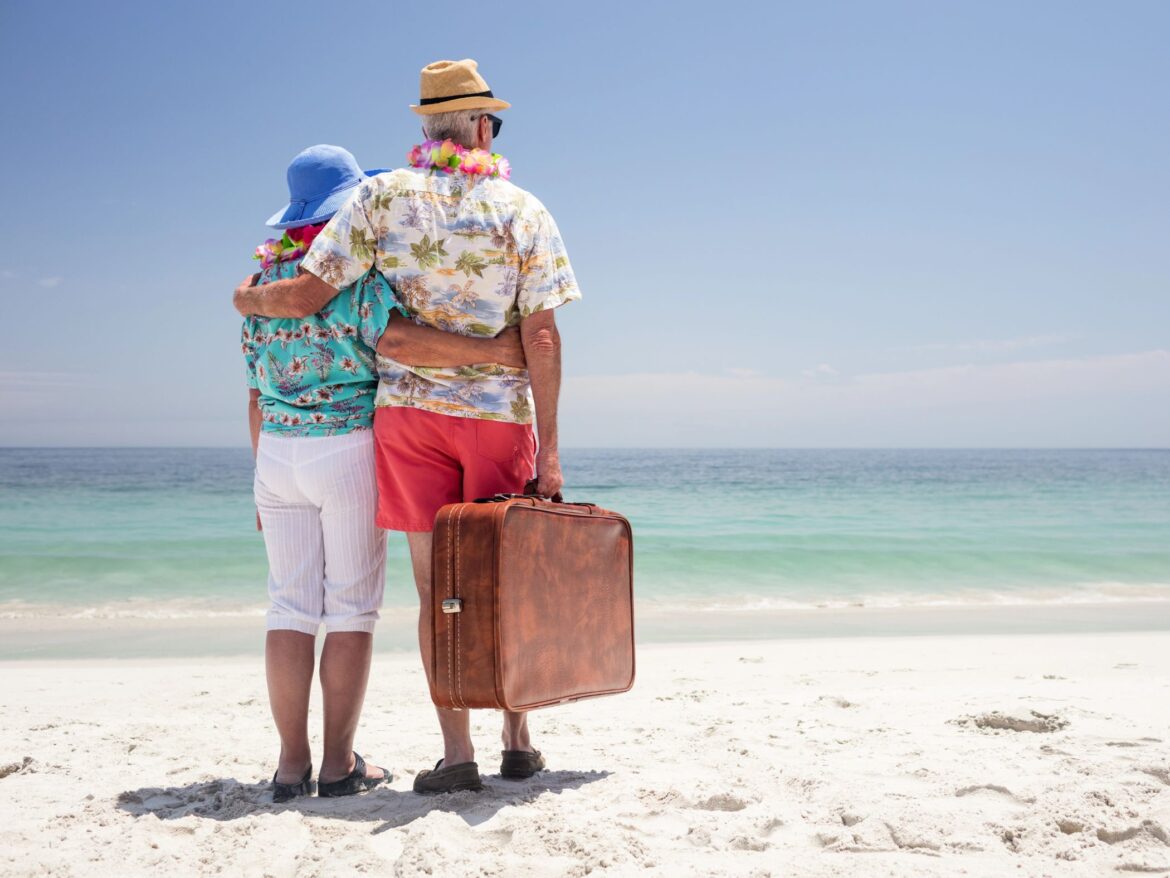Note: I am not a medical professional. You should always get advice from your doctor or healthcare provider before travelling if you have any health or medical concerns.
Picture this: standing at the edge of the Grand Canyon, wind in your hair, a vista that steals your breath. Or maybe it’s the bustling souks of Marrakech, a sensory overload of spices and sounds, or paddling a kayak down a serene New Zealand river. Age shouldn’t slam the brakes on these dreams. It’s about squeezing every drop out of life, leaping into new experiences, and saying a resounding “yes” to adventure. And yes, staying safe is part of the equation.
Medical alert systems aren’t just for staying safe at home anymore. With modern advances in technology, there are now trusted senior alerting tools that can keep you connected on the go too. They’re a powerful aid to help maintain your independence and confidence while travelling, giving you a safety net so you can enjoy the moment, without worry. This article explores how you can confidently embrace adventure, face safety concerns head-on, and how medical alert technology can offer comfort and peace of mind.
The New Era of Senior Adventure Travel
You’re not alone in wanting to get out there, and these days, seniors are travelling more than ever – and not just on gentle bus tours. Think hiking in the Alps, expedition cruises to Antarctica, and diving into different cultures worldwide. Senior explorers are prioritising experiences and active lifestyles, it seems.
The AARP (American Association of Retired Persons) suggests a growing trend in cycling holidays and multigenerational trips. For example, some tour companies offer small-group adventures tailored to seniors, focusing on activities that are doable and culturally rich. The world is your oyster, and it’s a fun time to be a senior traveller!
Common Concerns Seniors Face When Adventuring
Okay, let’s be honest, it’s daunting when you’re far from home, and any concerns you may have are valid. What if a health emergency pops up? What about getting around in unfamiliar places? How do you communicate if you don’t speak the language? These are all very real concerns, so it’s important to recognise them.
It’s not about pretending these concerns don’t exist, it’s about figuring out how to manage them when you’re away on your trip, and planning is the key. This is the basic support that allows you to enjoy the fun, rather than be dragged down by worries. If you’ve prepared well and have the correct tools, then the worry reduces.

How Medical Alert Systems Build Confidence and Independence
What are medical alert systems, exactly? They’re not those clunky devices from the past anymore – modern systems are designed for active lifestyles. They’re compact and wearable, like pendants or watches, and pack a serious punch, including GPS tracking, fall detection, and emergency communication.
- GPS Location Tracking: Pretty helpful. You can explore new places, knowing your location can be pinpointed if there’s an emergency.
- Worldwide or Nationwide Coverage: Many systems offer coverage across the country, and some even work internationally, which is great.
- Waterproof Designs: Whether you’re kayaking, swimming, or caught in a downpour, a waterproof system adds protection.
- 24/7 Emergency Response Connection: Medical alert systems connect you to trained professionals who can assess the situation and send help immediately.
Imagine this scenario: you’re hiking a remote trail in Yellowstone National Park and you fall and hurt your ankle. You’re in pain and can’t get up but your medical alert system detects the fall and automatically connects you to an emergency operator. Using GPS, they pinpoint your location and send park rangers to your rescue. Having this support up your sleeve really helps you relax and enjoy your trip more.
Choosing the Right Medical Alert System for Travel
Choosing the right system will increase your sense of safety. Here’s a quick checklist to help you evaluate your options:
- Portability: How easy is it to carry? A lightweight pendant or watch is ideal for travel.
- Battery Life: Make sure the battery lasts long enough for your travel days.
- Coverage Areas: Does it offer nationwide or international coverage?
- Smartphone Compatibility: Can it connect to your smartphone for added features?
- International Use Capability: If you’re traveling abroad, ensure the system works in your destination countries.
Think portable versus wearable. A pendant is more discreet, while a watch might offer more features. It’s about finding the right one for you. For example, the Medical Guardian Mini starts around $39.95 a month and is super lightweight, while the Bay Alarm Medical SOS Smartwatch, starting around $27.45 a month, has activity tracking in addition to GPS.
GPS tracking is essential, so you can be found quickly in an emergency. Fall detection provides automatic assistance if you’re unable to press the help button. You’ll be able to talk directly with the emergency responders using the two-way communication.
Some RV rental companies have fully equipped vehicles complete with roadside assistance and national park passes, which is great. It allows self-reliance without compromising safety. Just check that your medical alert has GPS.

Additional Safety Tips for Seniors Embarking on Adventure Travel
It’s not all about the technology, and preparation is key. Don’t just buy a medical alert system and expect it to solve everything.
- Share Travel Itineraries: Let family or friends know your travel plans, including destinations and activities.
- Research Medical Facilities: Find hospitals and clinics in the areas you’ll be visiting.
- Carry a List of Medications and Health Info: Keep a detailed list of your medications, allergies, and medical conditions.
- Purchase Adequate Travel Insurance: Ensure your travel insurance covers medical emergencies, trip cancellations, and other unexpected events.
- Practice Using Your Medical Alert Device: Before you leave, practice using your system to make sure you’re comfortable activating it and communicating with the response centre.
It can be a good idea to take a photocopy of your passport and keep it separate from the original, just in case. Additionally, you can programme emergency numbers into your phone before you leave home.
Embracing the Spirit of Adventure — at Any Age
Adventure is a mindset, not a physical test. It’s about exploration, curiosity, and enjoyment rather than extreme danger or pushing yourself too hard. Remember, it’s not just the youngsters who can have all the fun!
There are many travel companies that offer small-group adventures for seniors, so you’ll be holidaying with like-minded people. The itineraries are designed with physical limitations in mind, so you know you won’t be pushed too far. Senior-friendly hiking and biking trips with tiered activity levels, which allows you to choose routes that match your mobility.
With smart planning and resources, like a medical alert system, you can travel boldly and safely. There is a world of opportunity out there to see, so grab it while you can.
Final Thoughts
Seniors can and should embrace adventure – travel isn’t just for the young, it’s for everyone. Medical alert technology has made it safer and easier than ever to explore the world with confidence, and it gives real peace of mind. The world is waiting, so are you ready to answer the call?





